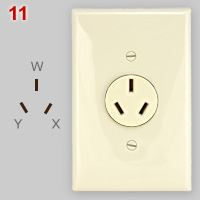 |
U.S. dual Amperage
and/or dual Voltage sockets |
info page |
NEMA page |
 |
 |
 |
 |
 |
 |
 |
 |
| 1 | Most
US sockets for 20A plugs are designed in a way
that they can also be used for 15A plugs. The image shows a duplex
socket
rated at 125V, 20A (NEMA 5-20R). See nos. 5 and 6 for
corresponding plugs. Manufacturer:
Leviton. |
| 2 | Scheme that illustrates which parts of slots are used for 125 or 250 Volt and 15 or 20 Amp plugs. |
| 3 | Combined 250 V, 15
and
20 A socket (NEMA 6-20R). This voltage is frequently used in North
America for more heavy duty
applications. See nos. 7 and 8
for corresponding plugs. Image no. 14 shows the Canadian version of
this socket. Manufacturer: Hubbell. |
| 4 | Dual
amperage (15-20A) and dual
voltage (125-250V) duplex socket. This
device accepts each of the plugs shown in images 5 to 8. See image nos.
10 and 11 for details. Manufacturer:
Leviton. There are some more special combination duplex sockets. Also combinations of flat blade and twist-lock devices exist. |
| 5 | 15A - 125V grounded plug (NEMA 5-15P). Manufacturer: Leviton, USA. |
| 6 | 20A - 125V grounded plug (NEMA 5-20P). Manufacturer: Leviton, USA. |
| 7 | 15A - 250V grounded plug (NEMA 6-15P). Manufacturer: Eagle, USA |
| 8 | 20A - 250V grounded plug (NEMA 6-20P). Manufacturer: Hubbell, USA |
 |
 |
| 9, 10 |
The
above scheme comes with the Leviton dual amperage / dual voltage socket
shown in image nos 4 and 10. Duplex sockets usually have
break-away tabs to separate the top and bottom outlet. In the Leviton
leaflet it is indicated as Break-Off Fin. Image no. 10 shows a duplex
receptacle with an intact fin (green arrow). Breaking the fin allows
placing the two outlets on separate circuits, each with its own breaker. Two branch circuits may share a neutral terminating on duplex sockets, a condition sometimes referred to as "split-wiring", "split-receptacle", or "split feed" (see scheme no. 12) |
 |
 |
 |
| 11 | Split-phase wiring
(see scheme at right) allows the choice of 120 or 240 Volt in a single
socket (see nos 9-10), or separate outlets.
The socket shown is a 20A NEMA 10-20R 3 pole, 3 wire non-grounding
receptacle*. Manufacturer: Eagle Electric. The combination of slots W and
Y (or X) gives 120V,
whereas X-Y offers 240V. Comparable sockets exist for 30A and 50A. A 15A-125V / 10A-250V
variant is now phased out. For household applications (for example
ranges and dryers) NEMA class 14 sockets and plugs are used, which have
an additional equipment ground wire (see examples in the heavy duty section). * the matching plug is identical to the Japanese 20A split-phase plug, and the Brazilian 20A "tristinha" plug. |
| 12 | Split-phase wiring,
which is commonly used is U.S. homes, has
two line wires ('hot' in American English), whereas the neutral wire is
a grounded center-tap of the secondary coil of the transformer; see
scheme. A combination of line-1 (X) or line-2 (Y) and neutral (W)
offers 120V.
Because of alternating current line-1 and -2 are out of phase and can
be combined to offer 240V. The scheme is based on information given on the HyperPhysics site (Georgia State University). |
| 13 | NEMA 6-20R, Canadian
version. NEMA 5-20R (no. 1) and 6-20R (no. 3) for the US market have
a T-shaped neutral slot so they will accept both 15A and 20A
plugs. The Canadian ones have to be designed to accept 20A plugs only*. Manufacturer: Bryant Hubbell. * The "20A only" socket is no longer required in Canada. USA-style NEMA 5-20R (125V) and 6-20R (250V) sockets are now approved by Canadian Standards Association. |